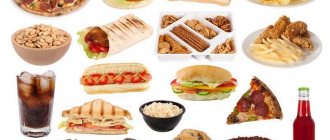What foods should you avoid?
In order for the baby to receive enough nutrients, vitamins and minerals with milk, the mother should adhere to a balanced and varied menu for the nursing mother. Food must undergo strict quality control, be hypoallergenic, fresh and environmentally friendly. Products containing preservatives, artificial colors, flavor enhancers and other chemical additives should be excluded from the diet.
While you are breastfeeding, new products should be introduced into your menu gradually, preferably one new product every two weeks - so that you can observe the child’s well-being, his mood, the condition of his skin and stool.
There are also general recommendations about what foods a nursing mother can include in her menu, and what she will have to give up for now. What are these requirements?
Breastfeeding: prohibited foods
- Alcohol
- Coffee, cocoa, strong tea
- Chocolate
- Citrus and exotic fruits
- Spicy foods, herbs (mint) and seasonings
- Raw onion and garlic
- Soy products
- Seafood, caviar
- Mushrooms
- Chicken eggs in case of allergies in a baby
- Peanut
- Honey
- Vegetables, fruits and berries of orange and bright red color
- Marinades, smoked meats, canned food, fermented products (kvass, cheeses, sauerkraut)
- Carbonated drinks
- Products containing food additives, colorings and preservatives
- Be careful with foods that cause gas (all types of cabbage, legumes, grapes, black bread)
Some of these products have a stimulating effect on the child’s nervous system and interfere with normal sleep; others are difficult to digest by the still imperfect digestive tract; still others can cause food intolerances and allergies. Fortunately, there are many more foods that are allowed on the menu of a nursing mother and her baby, and all of them can be gradually introduced into the diet as the baby grows.
As a rule, a nursing mother's diet changes slightly from month to month - along with the needs of the child's growing body.
Are dairy products acceptable for weight loss?
Although there are many variations of the milk diet online that promise miraculous weight loss just by drinking milk, it is not an easy path. Milk can help with weight loss, but without other important nutritional ingredients, the pounds will quickly return. But this does not mean that milk and dairy products are undesirable in the diet.
Vice versa. When losing weight, dairy products should be on the menu at least 3 times a day. For example, in the form of a glass of milk, yogurt, 50 g of cheese. There are a number of studies indicating a link between higher intakes of calcium, dairy proteins and weight loss.
Mom's nutrition: the first weeks
Immediately after childbirth, nutrition for a nursing mother will not be varied. Don't worry, this is temporary! And even with a limited range of products, you can create an interesting menu for yourself. Take a close look at the list recommended to you by your doctor and choose three or four options for breakfast, lunch and dinner. Pediatrician-approved products are your personal construction kit.
In the first 10 days, the mother pays close attention to her baby’s reactions to feeding. That is why at this time the menu is limited to products that are less likely to cause various allergic reactions in a child. Baked apples, bananas or pears, buckwheat and barley porridge, and vegetable soups are good for the first 10 days. Unrefined oils are best suited as seasonings: corn, olive, sunflower.
Ask the rest of your family to follow your diet during these three to four weeks so that you don't feel lonely and other people's delicacies don't deprive you of your will. And preparing three or four versions of dishes (for yourself and for others) is not the best activity for the mother of a newborn.
After 10 days, you can add fermented milk products (kefir, yogurt, cottage cheese, fermented baked milk) and vegetables (potatoes, carrots, beets, light pumpkin) to the menu. They are best baked, steamed, stewed or boiled.
In the second month after birth, the mother of an infant can gradually return eggs (preferably quail), grain bread or bread with bran (a little and only if you are sure that you do not have gluten intolerance), unsalted cheeses, durum wheat pasta, dried fruits ( dates, dried apricots, prunes), biscuits. And you should still avoid black tea and coffee, alcohol, sugar and large amounts of salt.
In the first two months after giving birth, it is very useful to keep a food diary: hang a table in the kitchen and enter information about what exactly you ate for breakfast, lunch and dinner, as well as during snacks and spontaneous raids on the refrigerator.
Milk diet - reviews and results
The creators of this unloading nutrition system promise brilliant results. Provided that everything is done as prescribed. In one week you can lose up to 6 kg. Well, that's impressive. What do reviews from those losing weight say?
Katyusha: I didn’t last until the end. after the first day the body began to rebel. I switched to kefir. The result is worth it: -4.5 kilos in 7 days
Kira: And already on the second call I’m going on a dairy diet. I like everything. Only I also go to the gym twice a week. My result is already -7 kilos (this is for the entire period). I never expected this.
Lika: Since childhood, I can’t stand milk. But after reading the reviews, I decided to go on such a diet. I can’t boast of any supernatural results, but I fell in love with the milk)))))
Alinka : Well, I don’t know if milk can be used as the basis of a diet. Can he only sit on it for a couple of days? And to deplete your body for weeks is unreasonable and even dangerous. I like kefir better
Ayla: I recovered a lot after the operation. I didn’t dare to go on any kind of diet. I just decided to introduce milk into my diet. And I started doing exercises every day. So in a month I lost 4 kilos.
Zhanna: And I started eating natural yogurt every day. Super. Such ease and no problems with stool. And the kilos are slowly but surely leaving me))
What can nursing mothers eat from 0 to 2 months?
- Apples, pears, bananas (baked)
- Cereals (buckwheat, barley, corn, rice)
- Soups - vegetarian
- Quail eggs
- Cereal products: durum wheat pasta, grain and bran bread
- Drinks: herbal or weak black tea, fruit drinks, dried fruit compotes
- Fermented milk products (kefir, plain yoghurts, cottage cheese, fermented baked milk)
- Steamed vegetables (potatoes, carrots, beets, light pumpkins)
- Quail eggs
- Biscuits
Nutrition for a nursing mother: from 2 months to six months
Starting from 3 months, you can gradually introduce some foods that were previously prohibited into your diet. After consuming each of them, you need to carefully monitor your baby’s reaction: if he has even a hint of an allergy, this product should be excluded and tried again in about a month. It is possible that the allergic reaction was simply a symptom of the immaturity of the baby’s digestive tract. Now you can add to your menu:
- Pearl barley, oatmeal, wheat and semolina porridge;
- Fresh fruits (not tropical and not containing red pigment);
- Juices (from green and yellow apples, soft pumpkin, carrots or beets);
- Sour cream;
- Morse made from blueberries, lingonberries, cranberries, rose hips.
You can also try to gradually include fresh onions and nuts in your diet (except pistachios and peanuts, which should be tried with caution, a couple of pieces a day). But the listed products will affect the taste of the milk, which the baby may not like. Therefore, it is important to know when to stop and be attentive to the behavior of the baby. Although scientists say that a baby’s eating habits begin to form in the womb: when the baby gradually swallows amniotic fluid, then his first acquaintance with his mother’s diet occurs.
Can I drink milk?
You should still be careful when handling cow's milk protein, as it often causes an allergic reaction in children. It is this that can cause abdominal pain in a child, so you should be careful when handling cow's milk products. Alternatives include goat milk products, including cottage cheese and plain yoghurts.
In addition to proteins, fats and carbohydrates, milk contains some vitamins and microelements, and its especially useful components are calcium and phosphorus. If, having included milk in your diet, you have not noticed a negative reaction in your baby, you can continue to consume it. Fermented milk products, such as kefir and cottage cheese, are especially useful now. A convenient option may be Agusha curd, rich in calcium and vitamin K2, which is necessary for the absorption of calcium by the bones.
At 4–6 months of life, the baby already tries his first complementary foods. At this point, you have generally learned how he reacts to milk composition based on changes in your diet. Now you can gradually begin to expand your menu by introducing beans, potatoes, mild cheeses and fish.
But remember that the meat of some types of fish may have a high content of heavy metals. Their concentration in the meat of shark, marlin and swordfish can significantly exceed the permissible limit; such fish should be completely excluded from the diet. Varieties such as mackerel, pink salmon, sockeye salmon, trout, and salmon can cause allergies. From the 6th month, you can begin to gradually introduce fish into the menu, but be sure to carefully monitor the baby’s reactions.
And of course, you should not eat raw fish, sashimi, or sushi. The pathogens with which she can be infected are extremely dangerous for both mother and baby, and medications that destroy the infection are incompatible with breastfeeding.
Dairy products for weight loss: benefit or harm?
Having received an affirmative answer to the question whether you can drink milk while on a diet, do not rush to buy the first product that catches your eye. Creams and fatty yoghurts are not as suitable for adults who care about their figure as they are for children. For a healthy lifestyle you need to make the right choices. Study the packaging, read the composition, fat, sugar, protein content. Consider studying individual food ingredients only as an initial gathering of information. Over time, you will learn which diet milk is ideal for you - that is, healthy and tasty at the same time.
Nutrition for a nursing mother: from 6 to 12 months
At six months, mother can gradually expand her diet, but preference should still be given to boiled, stewed, steamed or baked dishes. Try small quantities of fruits that you have previously abstained from. And it is better to conduct such experiments in the morning - so that during the day you can notice the baby’s reaction if it occurs. What you can try to include in your diet for 6 to 12 months:
- Meat (beef, chicken)
- Beans and legumes
- Boiled and stewed fish
- Seafood
- Zucchini, squash
- Cauliflower, cabbage, Brussels sprouts, broccoli (with caution)
- New fruits (moderate)
- Any nuts (except peanuts)
- Garlic
In the second year of the child's life, the mother returns to her normal diet - of course, taking into account the baby's preferences, if she continues to breastfeed.
To avoid allergies
While you are breastfeeding, you should avoid foods that cause allergies in your baby. Be sure to monitor your baby's reactions and observe how changes in your diet affect your baby's behavior, the condition of his skin, as well as the frequency and nature of stool.
There are several food groups that are best excluded from your diet during feeding.
- First of all, these are coffee, tea, alcohol, carbonated drinks and chocolate.
- Also on the list of prohibitions are exotic (especially citrus) fruits, soy derivatives, seafood, raw and lightly salted fish and products containing various chemical additives (preservatives, flavor enhancers).
- Sweet, fatty desserts should also be avoided while breastfeeding.
If a baby is predisposed to allergies, the mother should be especially careful about her diet. In this case, you need to limit your consumption of cow's milk protein. If a mother abuses these products, the baby may develop severe allergies, bloating and other unpleasant symptoms.
It is worth reducing the consumption of another protein - gluten, which is present in all cereals except rice, buckwheat and corn.
In children with a hereditary predisposition to allergies, a pigment that turns vegetables and fruits red often causes a reaction. Therefore, you should be careful about red fruits and berries in your diet.
Most often, allergies occur to cow's milk protein, chicken eggs, nuts and fish (more than half of all cases).
To choose the right products for her menu, a nursing mother can use the funny “traffic light rule”: the red, yellow and green colors of the products correspond to the traffic lights - from prohibitive red to permissive green.
Some decoctions, like coffee, can cause a negative reaction in a baby. This is ginseng (stimulates the nervous system), infusion of hawthorn (lowers blood pressure), sweet clover (contains substances that impair blood clotting), and mint.
Any new product is introduced into the diet of a nursing mother no more than once every two weeks.
If you notice signs of allergies in your baby
It may happen that, despite all the mother’s efforts to follow a diet that is as safe as possible for the baby, it is not possible to protect him from allergies: the mother could treat herself to a strawberry during the summer season or a tangerine on New Year’s Eve. How do you understand that your child’s body is signaling that he or she has a food allergy? What are the signs of allergies?
- Skin redness
- Excessive dryness of the skin or, conversely, its wetting
- Child's anxiety
- Bloating, colic, vomiting
- Diarrhea or constipation
- Difficulty in nasal breathing
If several of the above symptoms appear, you need to carefully look at your diet and remove recently introduced foods from it. After all manifestations of allergies have disappeared in your baby, you can carefully check your list of foods consumed for the presence of allergenic ones (and exclude them for the entire time of breastfeeding), gradually begin to introduce foods in small quantities (no earlier than a month) and carefully monitor the reaction. baby. The dose can be increased every few days. If there is no reaction in the baby’s skin and gastrointestinal tract, we can conclude that the product is not dangerous for him, and calmly eat it (in reasonable quantities!).
Diet for mom figure
A few months after giving birth, if there are no contraindications, the mother can slowly begin to take care of her figure: do exercises, adjust her diet and gradually expand her diet - after all, the most strict period of the first weeks after birth is over.
As a rule, the weight gained during pregnancy gradually begins to fall off after the 3rd month, when the mother’s body has become accustomed to the new rhythm and provided proper nutrition. The process of breastfeeding itself contributes to this, as well as, of course, the new, busy schedule of the young mother.
If the weight does not go away, you should reconsider your diet and change something in it, but in no case resort to strict diets when feeding an infant - this can harm the baby! Nutrition should be varied, but balanced and as healthy as possible.
When feeding a mother who wants to lose weight, a mother's diet must include protein of animal origin, as well as fermented milk products (if the baby is not allergic to cow's milk protein), vegetables and herbs. Green leafy vegetables (spinach, sorrel, lettuce) contain a lot of calcium, vitamins, and microelements that promote recovery after childbirth, as well as the normal functioning of the gastrointestinal tract. Not too sweet fruits and berries of soft colors are an excellent source of vitamins and antioxidants; they can be included in the menu.
It is worth excluding vegetables with a high starch content from the diet, and moving the intake of slow carbohydrates (bread, cereals, pasta) to the first half of the day. The same applies to sweets, which are generally best removed from the menu for this period. An exception may be, for example, dry unsweetened cookies.
And of course, drink plenty of fluids! It not only helps maintain water balance, but also stimulates lactation, especially if it is a warm liquid: a cup of warm drink 10 - 15 minutes before feeding stimulates the release of oxytocin and causes a flow of milk.
Breastfeeding is a wonderful time when a new mother has the opportunity to change her eating habits, learn healthy recipes and lay the foundation for a new, healthier lifestyle for years to come. We are sure that a nursing mother will no longer be able to change some of the eating habits acquired at this time after stopping breastfeeding, because they are aimed at maintaining the health of both babies and their adult mothers. Take care of your health! A breastfeeding diet for weight loss can be delicious!
Why you shouldn't eat dairy products when losing weight
Overall weight loss is the main reason why people wonder if milk is ok for their diet. Often all hopes are pinned on abandoning it. But experts agree that losing weight is an individual matter for each person. Its success also depends on the habitual consumption of milk and dairy products.
In terms of weight loss, everything is measured by fat content. Fatty foods contain many calories. This is the answer to the question why, when losing weight, you can’t eat milk with a fat percentage of more than 30–40% (cheeses) or 2–3% (yogurts). Reducing the amount of dairy products in the diet can regulate digestion and activate the weight loss process. But their exclusion leads to the loss of an important source of protein, without which weight loss will not be healthy.
But there is a more serious reason why you should not eat dairy products when losing weight - food intolerance or even allergies. A nutritionist will help you determine it. The most common diagnosis is the body's inability to digest milk sugar - lactose. Taking this factor into account, an individual diet is created that leads to the desired weight loss.
Where else besides dairy products is there lactose?
After learning why you shouldn't use dairy when losing weight, it's important to know that various dairy ingredients can also be present in other products. Most often this is:
- sweet and savory baked goods;
- waffles with filling;
- chocolate with filling;
- energy bars for athletes;
- fast food;
- margarines;
- cocktails for weight loss.
Lactose is also added to some milk candies, ice cream, and flavored potato chips. Its traces may even be present in ham and other sausages.










